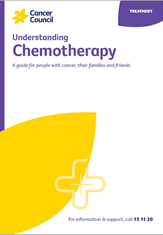- Home
- Cancer Information
- Cancer treatment
- Chemotherapy
- Managing side effects
- Blood-related side effects
- Bleeding problems
Bleeding problems
A low level of platelets (thrombocytopenia) can cause problems. You may bleed for longer than normal after minor cuts, have nosebleeds or bleeding gums, or bruise easily. Periods may be longer or heavier.
Your treatment team will monitor your platelet levels. If chemotherapy causes severe thrombocytopenia, you may need a platelet transfusion. Ask your specialist to explain the risks and benefits of this procedure.
Contact your treatment team or call Triple Zero (000) if you have any persistent bleeding, such as a nosebleed that doesn’t stop within 30 minutes.
How to manage a low platelet count
- Be careful when using knives, scissors or needles, as you may bleed easily from small cuts or nicks.
- Use an electric razor when shaving your face or body to reduce the chance of nicking yourself.
- Wear thick gloves when gardening to avoid injury. This will also prevent infection from soil, which contains bacteria.
- Avoid contact sports and high-impact activities, as these could cause bruising or bleeding if you get knocked or fall over.
- When brushing your teeth, use a soft-bristled toothbrush to avoid irritating your gums.
- Wear comfortable, well-fitting shoes indoors and outdoors to avoid cuts on your feet.
- Blow your nose with care.
- If you bleed, apply pressure to the area for about 10 minutes and bandage as needed.
- If you have problems with bleeding, talk to your doctor.
More resources
Prof Timothy Price, Medical Oncologist, The Queen Elizabeth Hospital, SA; Graham Borgas, Consumer: Dr Joanna Dewar, Medical Oncologist and Clinical Professor, Sir Charles Gairdner Hospital and The University of Western Australia, WA; Justin Hargreaves, Medical Oncology Nurse Practitioner, Bendigo Health Cancer Centre, VIC; Angela Kritikos, Senior Oncology Dietitian, Dietetic Department, Liverpool Hospital, NSW; Dr Kate Mahon, Director of Medical Oncology, Chris O’Brien Lifehouse, NSW; Georgie Pearson, Consumer; Chris Rivett, 13 11 20 Consultant, Cancer Council SA; Marissa Ryan, Acting Consultant Pharmacist (Cancer Services), Pharmacy Department, Princess Alexandra Hospital, QLD.
View the Cancer Council NSW editorial policy.
View all publications or call 13 11 20 for free printed copies.
Need to talk?
Support services
Coping with cancer?
Ask a health professional or someone who’s been there, or find a support group or forum
Need legal and financial assistance?
Practical advice and support during and after treatment
Cancer information
Managing cancer side effects
Detailed information on coping with the most common side effects experienced by people with cancer
Dealing with the diagnosis
Common reactions to a cancer diagnosis and how to find hope

